
Few philosophies have a greater mutual suspicion and natural antipathy to each other than libertarianism and ecology. This is not surprising, since the former takes the human individual and the latter the nonhuman environment, as its sovereign concern. But since our state-plagued era has seen the degradation of both individual liberties and the quality of the environment, we ought to question the degree to which these exist in an inverse relationship. Libertarians who wish to learn how to accommodate ecological ideas could do no better than to begin with a short 1975 novel by Ernest Callenbach, not because the novel has any libertarian intent (it clearly doesn’t), but because the principle of political decentralization, which Callenbach sees as an ecological necessity, leads him unconsciously, almost blindly, in a libertarian direction.
Ecotopia was clearly born out of the political and economic turmoil of the 1970s. As the book describes it, “The persistent inflation and recession of the seventies had caused widespread misery and undermined Americans’ confidence in economic progress.… And chronic Washington scandals had greatly reduced faith in central government.” Of course there was also a war that dragged on and on despite widespread opposition. In other words, it was a time much like our own, which may be why there has been a renewal of interest in the book in the last few years. A New York Times article from 2008 called it “The Novel that Predicted Portland” for its advocacy of green lifestyles. Well, not quite, as we shall see.
While contemporary greens tend to advocate greater power for national and international governmental agencies to regulate on behalf of the environment, Callenbach’s book was informed by decentralist and anti-authoritarian ideas of the New Left. These led him to a solution that had long since been thought impossible in American politics: secession. Ecotopia is also the name of a new nation in the novel, consisting of what used to be Oregon, Washington, and northern California, which seceded from the United States in 1980.1 In 1999, Will Weston, a journalist from what remains of the United States, sets out to write a series of articles about Ecotopian life. These, alternating with Weston’s private diary entries, comprise the novel.
[continue reading…]
Help Promote Prometheus Unbound by Sharing this Post
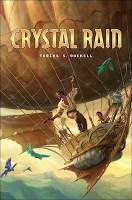
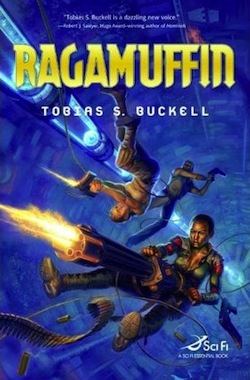 As I mentioned in my review of Crystal Rain, I enjoyed reading Tobias Buckell’s debut novel, but I enjoyed reading the sequel, Ragamuffin (Tor, 2008), even more. This may be because Buckell has grown as a writer or it may be because Ragamuffin is more a traditional galaxy-spanning space opera, one of my favorite subgenres. But another reason is that there are more prominent libertarian themes in Ragamuffin than there were in Crystal Rain, enough that it was a finalist for the 2008 Prometheus Award.
As I mentioned in my review of Crystal Rain, I enjoyed reading Tobias Buckell’s debut novel, but I enjoyed reading the sequel, Ragamuffin (Tor, 2008), even more. This may be because Buckell has grown as a writer or it may be because Ragamuffin is more a traditional galaxy-spanning space opera, one of my favorite subgenres. But another reason is that there are more prominent libertarian themes in Ragamuffin than there were in Crystal Rain, enough that it was a finalist for the 2008 Prometheus Award.
Where Crystal Rain was set on a lost colony planet mostly devoid of advanced technology, Ragamuffin opens on an advanced planet ruled by an alien race called the Gahe, who are themselves a client race under the rule of the secretive Satraps. Human beings are officially “free” in the “benevolent” Satrapy, but in fact are forced to live on the margins of society — on space stations in the middle of nowhere, on interdicted planets cut off from the rest of the galaxy by collapsed wormholes (including Earth itself), or on reservations. On the Gahe planet, Astragalai, humans who don’t want to serve in the role of intelligent pet for a Gahe master must live on a reservation, which they can only leave when granted a temperary “human safety” pass. Woe to the human who does not return to his reservation before his temporary pass expires: the penalty is death or enslavement.
We are first introduced to the protagonist of the novel, Nashara, on one such reservation called Pitt’s Cross. Fans of Pepper and John from Crystal Rain will be increasingly disappointed not to see them at the outset, so I think it is best to go into this novel with the foreknowledge that characters from Crystal Rain do not make an appearance until about halfway through. Still, Nashara does quickly grow on you and you will get to see Pepper open a big ol’ can o’ whoop ass eventually, so hang in there. And if it’s Pepper-style whoop ass you’re after, Nashara will not disappoint.
So, anyway, Nashara escapes Pitt’s Cross and rides on an orbital skyhook and transport pod up to a space station to meet up with a group, the revolutionary League of Human Affairs, for whom she had just completed a dangerous job. The League wants to overthrow the Satrapy and achieve real freedom for humanity. But Nashara’s loyalties lie elsewhere and she has a greater mission to accomplish. Things don’t go as planned, but Nashara manages to hitch a ride on a spaceship and proceeds to be hunted in a race across the galaxy by agents of the Satrapy.
[continue reading…]
Help Promote Prometheus Unbound by Sharing this Post
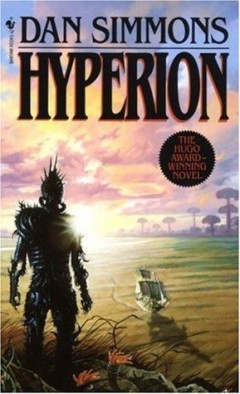
I found Hyperion to be the kind of book I hope every book will be when I first crack it open. This came as a mild surprise, given that it is modeled after The Canterbury Tales, in which a group of pilgrims take turns telling their stories of how they came to the pilgrimage. It is not a structure that thrills me, but the book is so well written, the world so well-conceived, and the stakes so unique and important that I found myself agreeing with the general critical acclaim that has been heaped upon it through the years. It is unquestionably one of the best scifi novels I have ever read.
In the world of the story, Earth has long since been destroyed and humans have colonized much of the galaxy. Most worlds are connected by worm holes, though a few exist outside this system; one such world is Hyperion. On Hyperion lives the Shrike, a mysterious creature that lives to kill. It is customary for some to make a pilgrimage to where the Shrike wanders, and when the Shrike finds a group of pilgrims it kills all but one member who may then petition it. This custom, at the time of the story, has almost been abandoned, but a group is put together for one last pilgrimage as a hoard of Ousters — nomadic humans who have taken to living in zero gravity and evolved into a different species — nears the planet and prepares to attack.
The setting for the story is richly imagined, on a level with Dune, Middle Earth and other such classics. The tales of the various pilgrims take us to many different worlds, and each becomes, as it is presented to us, distinct through the grand conception and the fine details. The planet of Hyperion is especially well conceived, with enough variety, plausibility, history and ingenuity to make us wonder if it might not actually exist somewhere. It holds the Time Tombs, grand and enigmatic structures that are moving backwards in time. There is a sea of tall grass that resembles a proper sea from afar, but none may cross it on foot because of the serpents that inhabit it. There is the abandoned Poets’ City, whose inhabitants were slaughtered by the Shrike. The other worlds are also differentiated. That old cliché in scifi in which each planet has one defining characteristic — and probably one culture, one language, one government — has given way to something more realistic in recent decades, and Hyperion is a prime example of this welcome trend.
[continue reading…]
Help Promote Prometheus Unbound by Sharing this Post
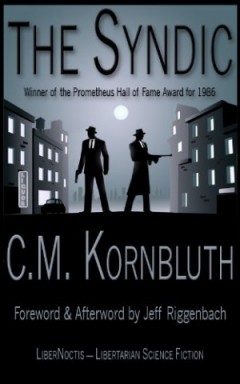
Get it for free in epub and mobi formats!
In a recent addition to The Libertarian Tradition podcast series, part of the Mises Institute’s online media library, Jeff Riggenbach discusses the brief life of C.M. Kornbluth (1923–1958) and his novel The Syndic.
You can also read the transcript below:
The late Samuel Edward Konkin III was a firm believer in the power of science fiction to spread the libertarian message. He himself had been converted to libertarianism partly by reading the works of Robert A. Heinlein, and Heinlein remained his favorite science fiction writer for the rest of his life. Every July for years, he threw a joint birthday party for himself and Robert A. Heinlein (Sam’s birthday was July 8; Heinlein’s was July 7). The last and largest issue of his magazine,New Libertarian, was devoted to Heinlein, as was a sort of mini-conference he held, also in the late 1980s, under the auspices of his Agorist Institute. This mini-conference featured presentations by Sam, J. Neil Schulman, and yours truly, along with much spirited discussion.
But if the works of Robert A. Heinlein topped Sam’s list of great libertarian science fiction, they were far from the only titles on that list. He was also a great admirer of Eric Frank Russell’s Great Explosion, for example. He expressed enthusiasm for A.E. van Vogt’s fiction, especially The Weapon Shops of Isher. And, he told me more than once in conversation, he held C.M. Kornbluth’s 1953 novel, The Syndic, in high esteem and considered it lamentably little known and much underappreciated among libertarian science fiction novels. I suspect part of the reason Sam never wrote about The Syndic was that he felt any public display of approval on his part for a writer like C.M. Kornbluth would require at least a bit of explanation. You see, Kornbluth was a Futurian, and libertarian science-fiction fans back in Sam’s heyday — the 1970s and ’80s — were almost always critical of the Futurians, if not openly hostile to them.
Libertarian science fiction fans of today care a good deal less for such ancient controversies, I suspect. Libertarian science-fiction fans under 40 are probably at least a little unclear on just who or what the Futurians were. Those old timers like me who know who they were have now lived long enough that we wonder whether it really matters who they were — whether it mattered even at the time.
[continue reading…]
Help Promote Prometheus Unbound by Sharing this Post
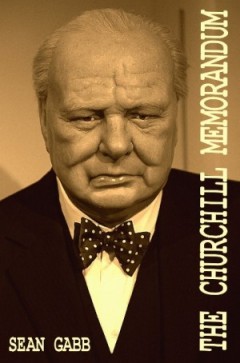
I recently read The Churchill Memorandum, by English libertarian Sean Gabb. I devoured most of it on a transatlantic flight, and finished the last bit on terra firma. I tend to like thrillers (some favorite authors include Nelson DeMille and, of late, Cherie Priest, author of Bloodshot); alternate history (e.g., Harry Turtledove, Brad Linaweaver’s Moon of Ice, L. Neil Smith’s The Probability Broach); and books with libertarian themes or influences (L. Neil Smith, Ayn Rand, Henry Hazlitt, Brad Linaweaver, Victor Koman, J. Neil Schulman). So it’s no surprise I enjoyed The Churchill Memorandum, which is very well written and which combines all three features (full disclosure: Gabb is a friend).
The novel is set in 1959, in an alternate history in which Hitler died in a car accident in 1939, thus averting WWII and changing the course of history. Gabb’s libertarian influences — he’s the head of the UK Libertarian Alliance — as well as his deep historical knowledge, are evident throughout the book. The novel depicts amazing technological progress — some of it rivaling or exceeding 2011 levels — in 1959, since WWII did not occur to sap away the economic strength and entrepreneurial innovations of tens of millions of individuals who would otherwise have been eviscerated in state war. So in 1959 there are magnetic bullet trains, home energy generators, and many other seemingly fantastic innovations.
The story follows the adventures of one Anthony Markham, a Churchill historian who, on a trip to the now-fascist police-state and isolationist America to research the Churchill archives at Harvard, stumbles across an explosive document that purports to document secret pacts that changed the course of American and world history. This leads to an intriguing geopolitical thriller informed by the author’s libertarian views. It is told in first person point of view (POV), my personal favorite for thrillers (and other novels) since it forces the narrator to show not tell, and not to omnisciently cheat and reveal details the protagonist would not know. Gabb’s ambivalent and somewhat bipolar English attitude towards America — at once a great power and friend of England, and a schizophrenic and dangerous destroyer of the ancient European order and institutions — is present throughout; and as a skeptic of the American mythos myself, I really enjoyed this foreign perspective. (Gabb recently presented a talk on “The Case Against the American War of Independence.”)
[continue reading…]
Help Promote Prometheus Unbound by Sharing this Post

Justin Cord, protagonist of The Unincorporated Man (2010 Prometheus Award winner for Best Libertarian Novel) once quips that, “You often learn more about a situation from the questions than the answers.”
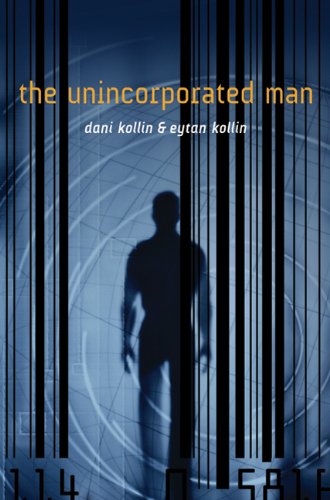
My highest praise for the book is for the questions it raises in the best tradition of social science fiction, questions that get us thinking about economic, legal, and even financial institutions in new ways. The book portrays a future society with a minimalist limited government, strong corporations, and a universal system of “personal incorporation.”
Each person is owned by a shifting combination of self and others through a joint stock arrangement set up at birth. Making corporations personal serves to amplify and universalize the conventional image of corporate titans maneuvering against each other for power and position. Everyone plays the “corporate game” and plays it with their whole lives, not just their jobs. Into this mix awakens one man from 300 years of suspended animation. Can he remain wholly self-owned? Will his ancient ideas of autonomy infect others and upset the new social order?
[continue reading…]
Help Promote Prometheus Unbound by Sharing this Post
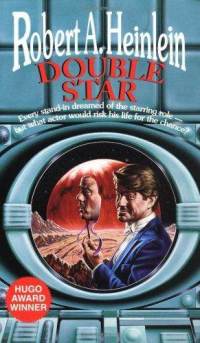
Robert Heinlein’s first Hugo Award winner was Double Star, a work that garners him far less attention today than his other Hugo winners. A reading of the novel will make obvious the reason for this: it is simply not as good. This is not to say that the book is poor, but for it to have won the Hugo Award in 1956, one must suppose either that it was a weak year for science fiction or that giving it the award was a mistake, akin to giving the Oscar to American Beauty or Shakespeare in Love.
It is something of a mystery to me why the novel does not amount to much. The protagonist has a distinct and interesting personality and the idea for the story holds promise. The prose is spare but efficient as you would expect from a Heinlein piece. What went wrong is that the plot is underdeveloped, a fault that would seem to be easily avoided, especially with a veteran author if he cares enough to put the effort into it. A writer needs to squeeze out of a story idea its potential, like one wrings the juice from an orange, and this is not achieved in Double Star. Given that The Puppet Masters came out a few years earlier, its weakness cannot be explained by an author who had yet to come into his own as a storyteller.
The main character is Lorenzo Smythe, an actor in the middle of some lean times but who preserves his pride and thespian affectation, though not to the point of becoming a caricature. He is offered a top secret job to impersonate a kidnapped Martian politician, Joseph Bonforte, until the man can be recovered. At stake is the peaceful equilibrium of human society.
[continue reading…]
Help Promote Prometheus Unbound by Sharing this Post

















